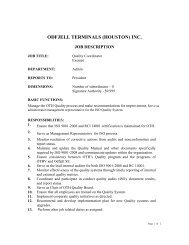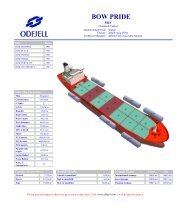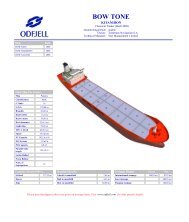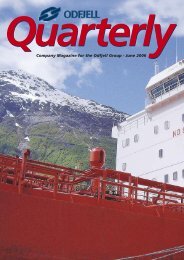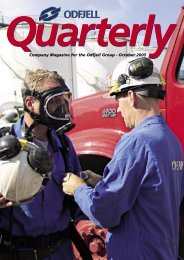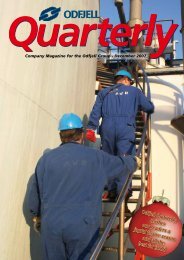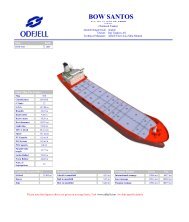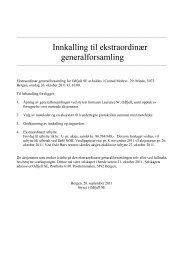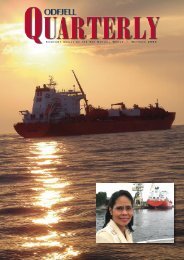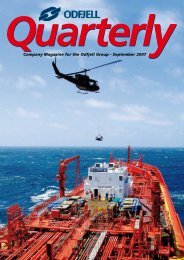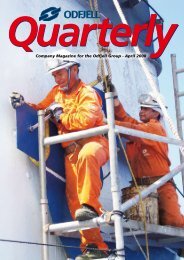Create successful ePaper yourself
Turn your PDF publications into a flip-book with our unique Google optimized e-Paper software.
chairman’s message<br />
ODFJELL QUARTERLY magazine<br />
10<br />
Laurence W. <strong>Odfjell</strong><br />
‘We are living in interesting times,’ my grandfather<br />
Bernt Daniel <strong>Odfjell</strong> was prone to say<br />
when the company was facing tough markets<br />
or uncertainty. We are heading toward the<br />
end of another challenging year and this is an<br />
opportune moment to reflect upon the macro<br />
picture and how we have been positioning<br />
ourselves for the future. Outlook for sustainable<br />
growth in the world economy is fraught<br />
with uncertainty in light of the continuously<br />
developing twists and turns of the sovereign<br />
debt crisis in Europe (and the US), the seeming<br />
shift of world economic power, and the<br />
political unrest in large parts of the world.<br />
As a global provider of transportation and<br />
storage services, our arena is global trade,<br />
so any impact on the demand side will only<br />
prolong the adverse effects we have been<br />
suffering from the supply overhang of ships.<br />
Many argue that the global economy never<br />
really exited the crisis of 2008/09. Of course,<br />
there was a seeming rebound in certain sectors<br />
during 2010, but no structural solutions<br />
to the fundamental challenges of an emerging<br />
new economic order (or call it reality) have<br />
yet been put forth. As the debt crisis has (re)<br />
entered center stage in Europe - social unrest<br />
is increasing. This unrest will probably only<br />
grow as unemployment levels in many mature<br />
economies are already at worryingly high<br />
levels. Some argue that the western world<br />
are at the end of a mega trend of continuous<br />
growth in prosperity since World War II. If<br />
so, how to adjust expectations? Taking away<br />
privileges or benefits is never popular and<br />
is something politicians only will do as a<br />
last resort. There should be no doubt that<br />
austerity measures in the public sector will<br />
hurt. They will also increasingly impact the<br />
private sector and the so-called ‘Main Street’<br />
economy, usually a lagging but nevertheless<br />
predictable effect. One emerging threat is that<br />
politicians revert to protectionist measures in<br />
an effort to protect or promote employment<br />
at home, thus responding to the demands<br />
of their electorate. Of course, protectionism<br />
would lead to reduced global trade, thus<br />
having a direct impact on the demand for<br />
our services.<br />
With projections of sluggish growth at best in<br />
the OECD countries, one would have hoped<br />
that international bodies would lighten<br />
the ever increasing load of new regulations<br />
coming into force. In the long view, certainly<br />
many of the initiatives by the EU, the US,<br />
the IMO, etc., will arguably safeguard public<br />
interests. However, all these initiatives come<br />
with short term costs of implementation and<br />
compliance, something that appears not to<br />
be fully appreciated by eager regulators in<br />
this challenging business environment. Who<br />
will foot the bill? Conventional wisdom would<br />
say that this will ultimately be paid by all of<br />
us (so a ‘tax’ on society). Can we really afford<br />
all of this now?<br />
In shipping, the anemic growth of demand<br />
combined with oversupply of ships in the<br />
many sectors has produced a deep crisis. Trade<br />
journals are filled with news of struggling<br />
operators and bankruptcies. Counterparty<br />
risk for our charterers is increasing. Are ships<br />
being maintained to safe standards when the<br />
owners are bleeding cash? Or what is the risk<br />
of an operator’s ships being arrested in port?<br />
Or performing reliably according to contract<br />
of affreightment?<br />
Of course, in the backdrop of the debt<br />
crisis (which easily can translate into a full<br />
blown banking crisis), financing of shipping<br />
activities will become an increasingly<br />
expensive and challenging proposition for<br />
many operators. Needless to say, banks are<br />
essential participants in our capital intensive<br />
business. Even before the crisis, banks had a<br />
large exposure to shipping by financing the<br />
lion’s share of newbuildings, etc. Now with<br />
equity being wiped away after years of losses,<br />
many banks have by default become large<br />
ship-owners, something which is tenable<br />
for only a relatively short period. The issue<br />
is often more complex because of how the<br />
industry now often relies on groups of lenders<br />
for so-called syndicated loans. The result is a<br />
group of lenders (complicated ever further if<br />
there are bondholders in the mix), becoming<br />
ship-owners with potentially very different<br />
agendas or requirements. In the absence of<br />
a ‘group will’ or ability to write off losses,<br />
companies are artificially kept afloat, thus<br />
possibly also delaying any recovery in the<br />
shipping markets. And now with counterparty<br />
risk reemerging with gale force within the<br />
banking world (just note how shares in banks<br />
have fared over the last three months), how<br />
to syndicate new loans in an environment<br />
where you cannot readily trust your typical<br />
fellow group lenders? It is certainly reassuring<br />
for us not to have uncovered investment<br />
commitments in this scenario.<br />
As the global financial crisis evolves, we start<br />
seeing signs that ‘the invisible hand of the<br />
market’ (as described by Adam Smith) could<br />
increasingly be replaced by protectionism in<br />
the form of duties on imported goods. Never<br />
good for trade. Never good for those of us who<br />
live by transportation and related services.<br />
And what is the worst part of this? There are<br />
no quick fixes in sight to ensure sustainable<br />
global economic growth. Our hopes are tied to<br />
the fortunes of the increasingly important role<br />
of the emerging markets, but these are also<br />
suffering increasing pains of modernization.<br />
More specifically to our particular shipping<br />
business, the health of our chemical tanker<br />
industry is weak after three years of freight<br />
rates at loss generating levels. We continue<br />
to face unprecedented challenges due to<br />
the inefficiencies of our trade, exacerbated<br />
by lacking shore infrastructure, high (and<br />
volatile) fuel costs, increasingly complex vetting<br />
regimes and the continued onslaught of<br />
regulations.<br />
A perfect storm is the joining of many adverse<br />
forces. Such a storm has been the backdrop<br />
for our activities in 2009, 2010, <strong>2011</strong> and<br />
probably will be for 2012 and onwards. Last<br />
year, we announced we would have to take<br />
measures to secure our business in face of<br />
turbulent waters. Our focus was to ensure<br />
control of our own fate, by taking measures<br />
to shore up our balance sheet, particularly to<br />
build cash and reduce forward commitments.<br />
In the course of a relatively short period, we<br />
have actually turned around our position<br />
(albeit still producing losses in the underlying<br />
operations of shipping). We have built up a<br />
war chest to survive a possible delay in the<br />
recovery of our markets. We have also entered<br />
into new partnerships that will allow us to<br />
invest in some of the many opportunities<br />
that appear on our radar screen. All this has<br />
been the fruit of dedication and hard work<br />
by many of you. I would therefore like to take<br />
this opportunity to recognize and express<br />
gratitude for the extraordinary efforts of many<br />
of you in these processes.<br />
In light of an outlook clouded by uncertainty<br />
and therefore lacking visibility, let me end<br />
this rather somber message by reassuring<br />
you that we are now better fit for fight. From<br />
a position of certain vulnerability at the end of<br />
last year, we are now, a year later, in a position<br />
of relative strength amongst our peers. Our<br />
main financing is secured, we have plenty of<br />
cash in our accounts and, importantly, we<br />
have not taken shortcuts affecting safety in<br />
our operations. We are, indeed, prepared for<br />
continued interesting times ahead.<br />
Stay safe.<br />
www.odfjell.com




